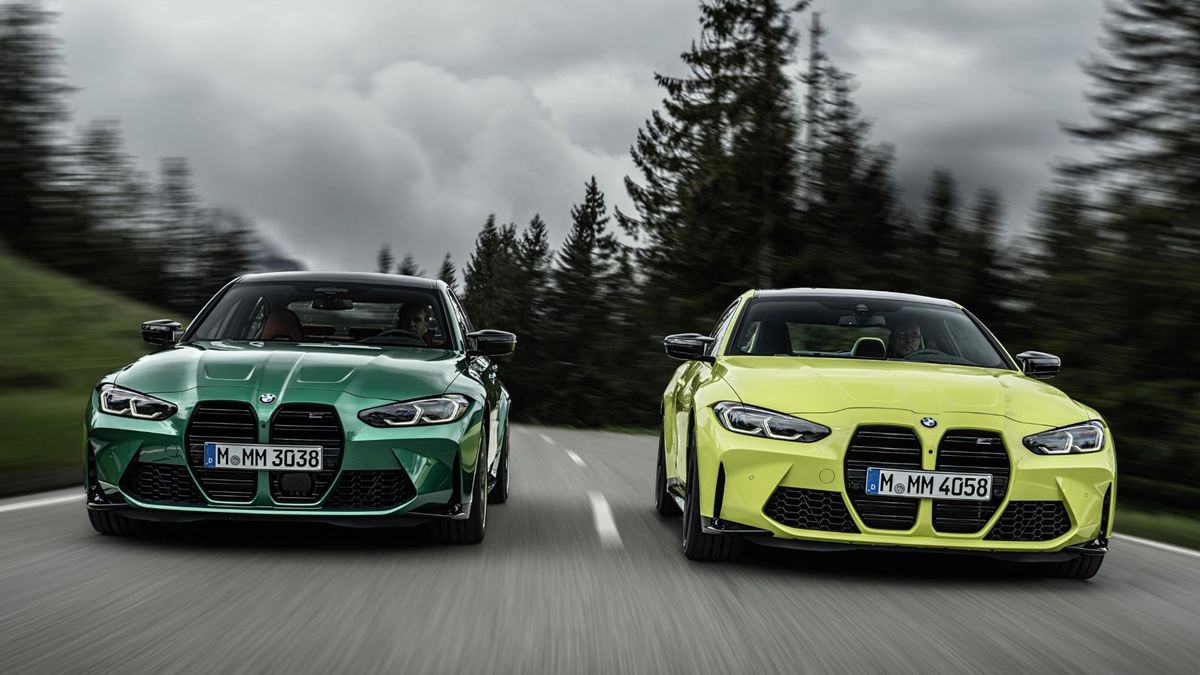First look: 2021 BMW M3 and M4 revealed, here early next year
BMW's M3 and M4 sedans take the spotlight ahead of their arrival in Australia during the first quarter of 2021.

BMW's 2021 M3 and M4 have officially been revealed and will be here in the first quarter of 2021 with rear-wheel drive, and late next year with all-wheel drive.
Before we dive in headlong, here are the confirmed numbers:
- The rear-wheel drive, manual M3 and M4 have 353kW of power and 550Nm of torque
- The 100km/h sprint time is a claimed 4.1 seconds, the 200km/h sprint takes 13.7 seconds
- The rear-wheel drive or all-wheel drive, automatic M3 and M4 Competition have 375kW and 650Nm
- The 100km/h sprint time is a claimed 3.9 seconds, the 200km/h sprint takes 12.5 seconds
All told there will be three M3/M4 options:
- Rear-wheel drive, non-Competition with a manual transmission
- Rear-wheel drive Competition with an automatic
- All-wheel drive Competition with an automatic
The engine in the M3/4 is a continuation of the S58 debuted in the X3 M and X4 M. It’s designed to deliver sharper throttle response than the engine in the previous M3, with a character that rewards drivers willing to chase the 7200rpm redline.
With Audi RS adding mild-hybrid technology to its cars and Mercedes-AMG reportedly developing an electrified four-cylinder powertrain for the next C63, the lack of 48V mild-hybrid technology in the new M3 is notable.
Also notable? The fact BMW has developed a 2021 M3 and M4 for purists, with rear-wheel drive and a six-speed manual.
“For me it was very, very important to offer this transmission,” BMW boss Markus Flasch told Australian media.
“It would have been difficult to offer it with mild hybridisation. Keeping the manual was one of the reasons not to go for 48V,” he said.
The M3 sedan has a rival in the manual Alfa Romeo Giulia Quadrifoglio sold in Europe, but three-pedal competitors for the M4 coupe are conspicuous by their absence.
The range-topping Competition packs a few technologies that break the M3 mould. The M3 and M4 Competition have followed the M5 in offering all-wheel drive – albeit as an option – for the first time.
Gone is the dual-clutch, variations of which were used on the E92 and F80 M3, replaced with the eight-speed torque converter now serving in the M5, X5 and X6 M, and M8.
The torque converter is no heavier than a dual-clutch, offers lightning gearshifts at full speed, and can be easily made to play nice with the complex electronic drive systems underpinning the latest BMW M cars, meaning there was “no reason” to keep the dual-clutch.
Rear-wheel drive will be the only option on the M3 and M4 Competition when they touch down early next year, with the all-wheel drive model to follow late in 2021.
As is the case in the bigger M5 and M8, the all-wheel drive system in the M3 Competition can cycle from a regular rear-biased mode, through an aggressively rear-biased setup, and into a pure rear-wheel drive setup depending on what the driver wants.
Flasch confirmed the hardware in the M xDrive system is identical to that used in the larger M5 and M8 options, albeit with some slightly different software to support the new Drift Assistant. More on that to come.
There are countless ways to personalise the way the M3 and M4 drive. Owners will be able to customise the throttle response, steering weight, brake pedal feeling, and the amount of traction control intervention, depending on their mood. There are 10 (yes, ten!) modes for the stability control, too.
BMW allows two preset drive modes to be programmed, controlled with two buttons poking out of the central steering wheel boss.
There’s a wealth of information on offer for keen track drivers. There’s a lap timer, which can keep track of your times and traces, and something called the M Drift Analyser.
BMW says it “records and rates driving stats posted in dynamic cornering manoeuvres”, which sounds to us like a fancy way to keep track of how much opposite lock you wound on before backing into a barrier.
Under the skin, the M3 and M4 ride on a stiffer chassis than the rest of the 3 Series and 4 Series line-up. There’s bracing in the engine compartment, a stiffer front axle subframe, and a rear axle subframe linked directly to the body, rather than with squishy mounts.
An adaptive M suspension is standard, with electronically-controlled shock absorbers and its own geometry to separate it from more mundane models.
The variable-ratio steering system is also unique, as are the brakes, and the M3 rides on 19-inch wheels wrapped in 275/35 tyres up front and 20-inch wheels with 285/30 rubber at the rear.
Inside, the M3 and M4 will be available with a range of bright colour schemes, as evidenced by the treatment of the cabins pictured below.
It appears a choice of comfort-focused or racier carbon-backed bucket seats will be available.
And externally? You can see for yourself. The tall grille from the 4 Series features on both the M3 and M4, flanked by a deep, aggressive air intake on the front bumper.
The arches have been pumped up, the bonnet has aggressive ridges, and the side skirts are more sculpted than those of the regular 3 Series and 4 Series.
Down back, the quad exhaust pipes sit in the centre of an angry-looking diffuser, and the boot lid is home to a subtle lip spoiler. BMW says the sports exhaust should deliver a distinctive sound, too.
“We really took the design of the 4 Series to another level,” Flasch said.
"We got rid of the kidney frame, we have an embossed bonnet that takes on the geometry, and also the rest – the wheel arches, the skid plates, the diffuser – it’s very much different [to the regular 4 Series].”
Standard equipment will be generous. A full range of active safety equipment will be included, from autonomous emergency braking and adaptive cruise control to lane-keeping assist, blind-spot monitoring, and rear-cross traffic alert – while the full kit bag of parking assistants, surround-view cameras, and reversing aids are standard as well.
Owners will be able to opt for a sunroof as a no-cost option, although that does necessitate subbing the carbon roof for a heavier steel one.
This article is published under license from Car Expert: the original article can be viewed here





















24 Jan 2018
Total posts 3
Still slower than a Tesla Model 3 Performance, and $50K more expensive. I'll take the Tesla.
Qantas - Qantas Frequent Flyer
28 Jul 2016
Total posts 105
They’re completely different cars aimed at completely different demographics. Yes in some respects they’re comparable but the Tesla would have nothing on the BMW’s handling and build quality.
24 Jan 2018
Total posts 3
You'd be surprised how many Model 3 Performance Owners have come from an M3 or similar as their previous car. It was designed as a direct competitor.
Both are premium 4 door sports sedans, with almost identical dimensions.
Top Gear shootout TM3P v M3. And note the Tesla has had a free over-the-air speed and power upgrade since this clip, so the difference is even greater now.
https://youtu.be/DSRWKxytW40
Why the Model 3 Performance is better than an M3
https://youtu.be/j9LS7O7UqZ0
Virgin Australia - Velocity Rewards
07 Dec 2014
Total posts 170
They look like they have giant buck-teeth.
Qantas - Qantas Frequent Flyer P1
23 Aug 2014
Total posts 148
Speed, like size, isn't everything
Hi Guest, join in the discussion on First look: 2021 BMW M3 and M4 revealed, here early next year